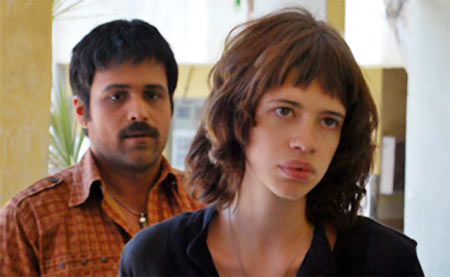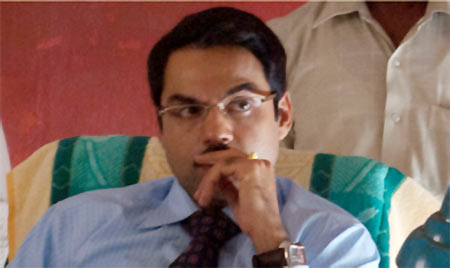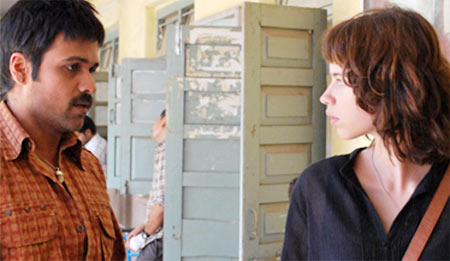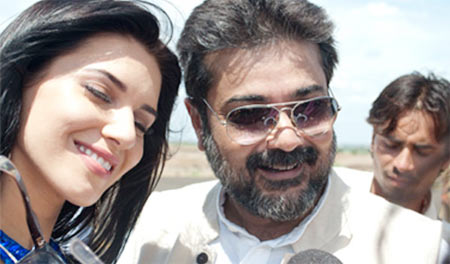Image: A scene from Shanghai
Shelly Walia in Mumbai
Shelly Walia in Mumbai
With Shanghai, Dibakar Banerjee has set off in a new direction. The same could be said about actor Emraan Hashmi. Shelly Walia finds out whether the journey has been worthwhile.
Ironically, 'Bharat Mata ki Jai' will not go down in the list of famous patriotic ditties. The controversial song from last Friday's release, Shanghai, carries the message loud and clear. India has metamorphosed -- from Mohammed Rafi's timeless tune from the 1965 film Sikandar-e-Azam "Jahan daal daal pe sone ki chidiya karti hai basera" to the contemporary times of "Sone ki chidiya, dengue, malaria". Patriotism has a new meaning -- it is iconoclastic and rebellious.
Based on the novel Z by Greek author Vassilis Vassilikos, director Dibakar Banerjee's Shanghai is set in this changing Bharat. A political party envisions an International Business Park (a special economic zone) as the future of a small town, Bharat Nagar -- a progressive transformation, creating no less than the Chinese city of Shanghai in India.
Against this backdrop is set a political thriller. An activist and socialist professor, Ali Ahmedi (Prosenjit Chatterjee), who wants people to see the flip side of this transformation, is mowed down by a drunk truck driver. A south Indian IAS officer, T A Krishnan (Abhay Deol), a student, Shalini (Kalki Koechlin), and a journalist-cum-porn film maker, Jogi Parmar (Emraan Hashmi), get embroiled in this gruesome incident. As they seek justice for Ahmedi in the labyrinth of Indian democracy, individual stories unfold and the suspense deepens.
Ironically, 'Bharat Mata ki Jai' will not go down in the list of famous patriotic ditties. The controversial song from last Friday's release, Shanghai, carries the message loud and clear. India has metamorphosed -- from Mohammed Rafi's timeless tune from the 1965 film Sikandar-e-Azam "Jahan daal daal pe sone ki chidiya karti hai basera" to the contemporary times of "Sone ki chidiya, dengue, malaria". Patriotism has a new meaning -- it is iconoclastic and rebellious.
Based on the novel Z by Greek author Vassilis Vassilikos, director Dibakar Banerjee's Shanghai is set in this changing Bharat. A political party envisions an International Business Park (a special economic zone) as the future of a small town, Bharat Nagar -- a progressive transformation, creating no less than the Chinese city of Shanghai in India.
Against this backdrop is set a political thriller. An activist and socialist professor, Ali Ahmedi (Prosenjit Chatterjee), who wants people to see the flip side of this transformation, is mowed down by a drunk truck driver. A south Indian IAS officer, T A Krishnan (Abhay Deol), a student, Shalini (Kalki Koechlin), and a journalist-cum-porn film maker, Jogi Parmar (Emraan Hashmi), get embroiled in this gruesome incident. As they seek justice for Ahmedi in the labyrinth of Indian democracy, individual stories unfold and the suspense deepens.
'Abhay's role as a typical Tamilian bureaucrat did not come easy'
Image: A scene from Shanghai
"Like Farooq Sheikh (cast as the subtle and scheming right-hand man of the state chief minister) said after watching Shanghai, the film gives you a goodbye gift. One gets engaged and entertained while watching it, but in retrospect, you realise you are carrying with you a meaning, a message, a reality," says Banerjee.
No wonder Banerjee feels this has been his most challenging project. "We shot primarily in Latur and Baramati in Maharashtra. We had to create this small town, Bharat Nagar, and adorn it with election festivities. At the same time, the characters had to be in sync with the script, without losing the pace," Banerjee says.
Setting off on in a new direction has not been easy. The context of Shanghai is close to reality, true to Banerjee's earlier Oye Lucky Lucky Oye (based on a true story of a thief on the run), Khosla ka Ghosla (a comedy around a middle-class family's aspiration to own a plot in New Delhi) and Love, Sex Aur Dhokha (a stark portrayal of MMS scandals and sting operations). But he believes a lot more work was required this time to carve out each character.
"Abhay's role as a typical Tamilian bureaucrat did not come easy. The character is the voice of the establishment and has power, but is conservative. His character has shades of grey, which keep the audience guessing. To get the accent right, he had to undergo a month-long language workshop where he learnt to speak English and Hindi with a Tamil twang," says Banerjee.
Deol also trained himself with the IAS machinery to get the body language and the stern expression correct. "He plays a character much older than his real self. He needed to walk with a slight stoop, as someone who has led a sedentary life of working on the laptop for long hours," Banerjee adds.
No wonder Banerjee feels this has been his most challenging project. "We shot primarily in Latur and Baramati in Maharashtra. We had to create this small town, Bharat Nagar, and adorn it with election festivities. At the same time, the characters had to be in sync with the script, without losing the pace," Banerjee says.
Setting off on in a new direction has not been easy. The context of Shanghai is close to reality, true to Banerjee's earlier Oye Lucky Lucky Oye (based on a true story of a thief on the run), Khosla ka Ghosla (a comedy around a middle-class family's aspiration to own a plot in New Delhi) and Love, Sex Aur Dhokha (a stark portrayal of MMS scandals and sting operations). But he believes a lot more work was required this time to carve out each character.
"Abhay's role as a typical Tamilian bureaucrat did not come easy. The character is the voice of the establishment and has power, but is conservative. His character has shades of grey, which keep the audience guessing. To get the accent right, he had to undergo a month-long language workshop where he learnt to speak English and Hindi with a Tamil twang," says Banerjee.
Deol also trained himself with the IAS machinery to get the body language and the stern expression correct. "He plays a character much older than his real self. He needed to walk with a slight stoop, as someone who has led a sedentary life of working on the laptop for long hours," Banerjee adds.
'Emraan Hashmi took dancing lessons'
Image: A scene from Shanghai
For Hashmi's character, Banerjee needed an actor with whom the audience would connect. "Jogi is a street-smart cameraperson and part-time porn filmmaker. We researched quite a bit on porn filmmaking. The character had to appear dirty and sleazy, so we made him gain 10 kg. He had to have a paunch, blackened teeth and a darker complexion. He also took dancing lessons. Everything about him is in stark contrast to his earlier image," Banerjee says.
While putting together the cast for Shanghai, Kalki Koechlin seemed an obvious choice. Banerjee says, "She plays a half-British and half-Indian student, who is very idealistic in her beliefs. We gave her a new hairstyle to make her appear attractive and messy at the same time. Her look is intense and without any make-up." On Bengali star Prosenjit Chatterjee, Banerjee says they had to work on his Hindi-speaking skills.
Deol plays his role with poise and composure, keeping the audience guessing as to what's coming next. Although Koechlin's story is only partially told, what with her father being involved in a Rs 40-crore fraud or her studies abroad, she seems the same disoriented girl from That Girl in the Yellow Boots and Shaitan. Under Banerjee's direction, Hashmi too proves himself as an actor. Unfortunately, Chatterjee's character is short-lived.
As the murder mystery unravels, the story gets compelling and enthralling. For the reality of contemporary India, the last scene sums it all. With our flawed political machinery and corrupt practices, do we choose to be honest or corrupt in our path to progress? The election milieu, a loud, reverberating soundtrack and a wonderfully woven story of different individuals make the film a compelling watch.
While putting together the cast for Shanghai, Kalki Koechlin seemed an obvious choice. Banerjee says, "She plays a half-British and half-Indian student, who is very idealistic in her beliefs. We gave her a new hairstyle to make her appear attractive and messy at the same time. Her look is intense and without any make-up." On Bengali star Prosenjit Chatterjee, Banerjee says they had to work on his Hindi-speaking skills.
Deol plays his role with poise and composure, keeping the audience guessing as to what's coming next. Although Koechlin's story is only partially told, what with her father being involved in a Rs 40-crore fraud or her studies abroad, she seems the same disoriented girl from That Girl in the Yellow Boots and Shaitan. Under Banerjee's direction, Hashmi too proves himself as an actor. Unfortunately, Chatterjee's character is short-lived.
As the murder mystery unravels, the story gets compelling and enthralling. For the reality of contemporary India, the last scene sums it all. With our flawed political machinery and corrupt practices, do we choose to be honest or corrupt in our path to progress? The election milieu, a loud, reverberating soundtrack and a wonderfully woven story of different individuals make the film a compelling watch.
'The movie will not help Emraan Hashmi in an image makeover'
Image: A scene from Shanghai
Like Banerjee, Hashmi too steps into unexplored territory with Shanghai. A step away from the Mahesh Bhatt camp (most of his successful films have so far been with Bhatt) and in the midst of an offbeat cast, the actor outshines everybody else. But experts don't think this will do much to change his "lover boy" image. Hashmi today is the example of a successful actor with several box office hits, but one who has not been offered any brands to endorse.
Brand strategy specialist Harish Bijoor says, "The movie will not help Hashmi in an image makeover, despite this being an out-of-the-box role for him. Brand advertisements are all related to happy stars." Bijoor cites the example of a popular actor like Shatrughan Sinha in the '80s, who would only endorse liquor brands such as Bagpiper Whiskey. Similarly, John Abraham's happy-go-lucky image works well for him in the advertising space, though he is not as successful at the box office, Bijoor says.
Brand expert Gullu Sen says that the Indian consumer is still very conservative. "It took Salman Khan years to rebuild his image. For Hashmi this must be a beginning, but there is a long way to go before he starts endorsing brands."
And though he plays a well-meaning journalist in Shanghai, here too his earlier image seems to have stuck on. So there he is, in spite of all that makeover, still doubling up as a porn film maker.
Brand strategy specialist Harish Bijoor says, "The movie will not help Hashmi in an image makeover, despite this being an out-of-the-box role for him. Brand advertisements are all related to happy stars." Bijoor cites the example of a popular actor like Shatrughan Sinha in the '80s, who would only endorse liquor brands such as Bagpiper Whiskey. Similarly, John Abraham's happy-go-lucky image works well for him in the advertising space, though he is not as successful at the box office, Bijoor says.
Brand expert Gullu Sen says that the Indian consumer is still very conservative. "It took Salman Khan years to rebuild his image. For Hashmi this must be a beginning, but there is a long way to go before he starts endorsing brands."
And though he plays a well-meaning journalist in Shanghai, here too his earlier image seems to have stuck on. So there he is, in spite of all that makeover, still doubling up as a porn film maker.






Comment
article